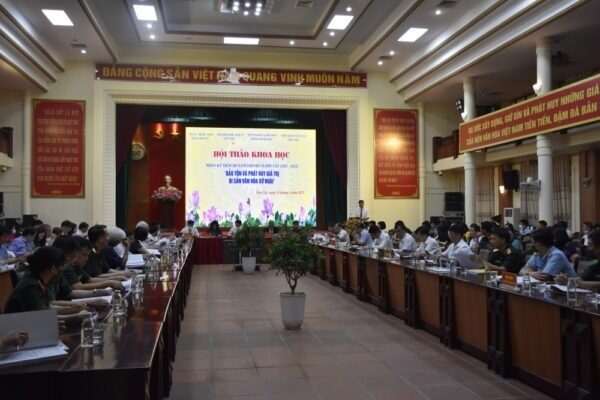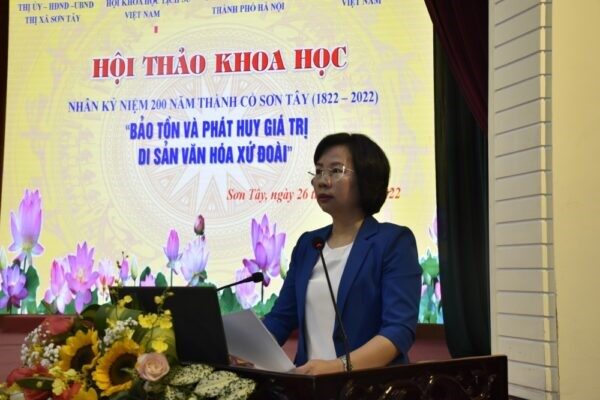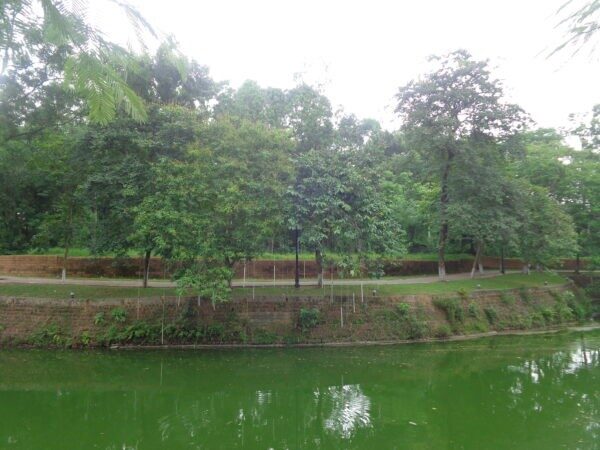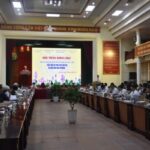On April 26, the City Party Committee, People’s Council, People’s Committee of Son Tay Township in collaboration with the Department of Culture and Sports of Hanoi city and the Vietnam Historical Science Association held a scientific seminar called “Preserving and promoting the value of cultural heritage of Doai region” on the 200th anniversary of the construction of Son Tay Ancient Citadel (1822-2022)

Attending the conference, there were comrades Bui Huyen Mai – Member of Standing Committee, Head of Hanoi city Propaganda and Training Commission; Nguyen Thanh Binh – Head of Social Culture Department, City People’s Council; Tran Thi Van Anh – Deputy Director of Hanoi Department of Culture and Sports; Nguyen Hong Minh – Deputy Director of Hanoi Department of Tourism; Tran Anh Tuan, Member, Secretary of the Son Tay City Party Committee, scientists and cultural researchers…

Speech of the Head of Hanoi city Propaganda and Training Commission on the cultural and historical values of the ancient Citadel
The scientific conference “Preserving and promoting the value of cultural heritage of Doai region” included 3 topics: The typical cultural value of Doai region in the Vietnamese cultural flow; Son Tay ancient Citadel in the history of citadel construction in Vietnam, the position, role and typical values of Son Tay citadel in the cultural history of Doai region; Preservation and promotion of the value of cultural heritage of Doai region and Son Tay ancient Citadel. 39 discourses were sent to the conference. At the conference, the delegates mentioned many issues in preserving and promoting the cultural values of Doai Region, such as: Conservation of festivals; some typical values of Doai’s beliefs and religions; Doai’s heritage in connecting cultural space and architectural landscape; the tradition of academics and laureates from Doai…
Previously, the land of Doai was an ancient and large land in the west of Thang Long Citadel, the cradle of ancient Vietnamese civilization, where the Hung Kings founded the country and built the capital. The land of Doai is also the birthplace of many talents of the country and a place to keep many valuable tangible and intangible cultural values.
Professor, Doctor of Science Vu Minh Giang, Vice Chairman of the National Council of Cultural Heritage said that: Doai is a cultural space with a special position in the entire cultural process of Vietnam. The preservation and promotion of the cultural heritages of Doai need to continue to go into depth. What needs to be done immediately is to focus on creating highlights in Son Tay township, where the values of Doai’s cultural heritage converge and spread, in which, three heritages should be paid attention first include Son Tay Ancient Citadel, Duong Lam ancient village, and Va temple festival.
Associate Professor, Dr. Pham Van Duong, Deputy Director of the Institute of Cultural Research, Vietnam Academy of Social Sciences, stated that the land of Doai was strongly influenced by the urbanization of Hanoi, gradually forming a rural cultural area in the heart of urban areas, but the core values of Doai’s culture were still like a source circuit silently continuing, creating a distinct nuance of Son Tay – Hanoi…
Speaking at the seminar, Member, Secretary of the Son Tay City Party Committee Tran Anh Tuan remarked: Son Tay township had an abundant heritage system and rich tradition. Son Tay Citadel was one of the significant towns protecting the ancient Thang Long Citadel…
In the history of the cultural region of Doai, Son Tay Citadel plays a very important role and position. Son Tay Citadel is an ancient military architecture built of laterit, with an area of 12 hectares. The citadel was built in 1822, with 4 gates facing the North, South, West and East directions and the citadel was surrounded by moat… The Son Tay Ancient Citadel relic has been ranked as a national historical relic by the Ministry of Culture and Information according to Decision No. 2754/QD-BVHTT, dated October 15, 1994.
Scientists, researchers in the field of conservation – museums, managers in the field of cultural heritage, representatives of authorities, local departments and agencies also proposed many solutions to preserve and promote cultural heritage value of Son Tay Ancient Citadel.
Major General, Dr. Nguyen Xuan Nang, former Director of the Vietnam Military History Museum, suggested that Son Tay township should continue to research and propose the restoration of the remaining items of the Citadel as it was, creating the basis for other localities to restore the ancient citadel when there are favourable conditions.

A corner of the Citadel
Dr. Nguyen Van Son, Chairman of the Hanoi Historical Association affirmed that Son Tay Citadel had a special position in the central area. It is surrounded by the densest density of historical and cultural relics such as: Ancient villages in Duong Lam, Va Temple, Phung Hung Temple, Ngo Quyen Tomb, Tay Dang Communal House, Mia Pagoda, etc. It is a favorable condition for tourism development planning, creating the most prominent convergence point in Doai region’s culture.
Many experts believe that the research and conservation of Son Tay Citadel need to be further promoted so that Son Tay Citadel is eligible to become a remarkable national-level relic, representing typical of the type of Nguyen ramparts in the 19th century.
Receiving feedback from scientists, leaders of Son Tay township, in the coming time, will seek for solutions to preserve and promote the value of the cultural heritage of Doai and the relics of Son Tay ancient citadel, contributing to honoring and creating motivation for the development of the town and the capital.
Thanh Thanh

